JOI’s New Glass Containers: A More Sustainable, Reusable, Natural and Clean Packaging Alternative

JOI’s New Glass Containers: A More Sustainable, Reusable, Natural and Clean Packaging Alternative
Oct 7, 2021 | By JOI team
Announcement time! JOI is making the switch to glass packaging for all of our creamy plant bases! Why is this so cool? Lots of reasons (including opportunity for sweet DIY gifts--but more on that later). We’ll break down the eco-friendly benefits of glass vs plastic packaging and offer up some creative reuse options. But first, a little backstory.

JOI’s Sustainability Philosophy: Go Slow and Do Things Right
Living sustainably is all about small shifts and incremental improvements. It’s not about boiling the ocean (dark pun intended, and apologized for).
Seriously though, spend too much time thinking about all of the things that you really, really should already be doing to help our fragile planet, and you will probably end up back in bed with your head under a pillow. Focusing on sustainability is a marathon, not a sprint, and if reducing your environmental impact is the goal, you’ve got to get there, well, sustainably. It’s not about becoming the perfect environmental steward overnight; it’s about making high-impact changes that you’ll actually be able to stick with.
From day one, sustainability has been a grounding value at JOI. However, we’ve also been realistic that our goals weren’t going to happen overnight. We’ve prioritized giving ourselves the grace to do what we can, at the point we’re at, and make improvements as it makes sense for our business and the customer experience we can provide.
This approach has allowed us to reach some pretty cool sustainability milestones, including unveiling our new Instant Organic Oat Milk Powder in durable, post-consumer recycled (PCR) pouches. Now, we’re super excited to be at a point where we can transition to packaging that is just as natural and clean as our products. That means making the switch to glass jars for our conventional and organic almond, cashew, and hazelnut plant bases!
Why Switch from Plastic to Glass?
Living sustainably is rarely a black-or-white thing. There are always costs and benefits to weigh--it’s a complicated moral calculus, especially for small start ups with limited resources. At JOI, we’ve always wanted to put customer experience at the forefront of the equation. That’s why we chose to launch using plastic containers rather than glass for our OG lineup of plant bases.
Plastic packaging is simply the most readily available and most affordable solution that is at least partially recyclable. There’s a whole alphabet soup of options when it comes to type of plastic. You might have heard of PET plastic, HDPE plastic, or BPA-free plastic, or maybe you’ve wondered what the deal is with those recycling numbers on the bottom of plastic bottles. Different types are best suited to different uses, and they all have pros and cons. But, across the board, plastic is light-weight, cheap to ship, and hard to break.
With plastic packaging, we knew from the start we could make sure we were building reliable, cost-effective supply chains. We chose polypropylene (PP) , or ‘#5’ plastic, for our original plastic containers because it’s been recognized for decades as being food-safe and heat-resistant, and it’s accepted by most recycling programs. Those plastic containers were a great first step to provide a solid customer experience within the bounds of our sustainability philosophy while we focused on developing truly outstanding plant bases. But, we’ve always known plastic is not the long-term packaging solution.
Lately we’ve been hearing more and more from our amazing customers about their own sustainability philosophies, and it’s bubbled up time and again--our plant base products completely fit those ethos, but our plastic packaging material does not. We know you want ALL aspects of JOI products to be something you can trust as being uber-clean, completely natural, and in-line with a minimal impact lifestyle. We also know that as a company, we are at the point where we can afford to utilize the kind of packaging that will fulfill those requirements, without sacrificing anything in terms of product quality, availability, or shipping.
Lots of companies grow up and cut costs by making the opposite switch--from glass to plastic--but that’s not us. We want to grow up and continuously get better for our customers. That’s why we’re making the plastic to glass switch now.
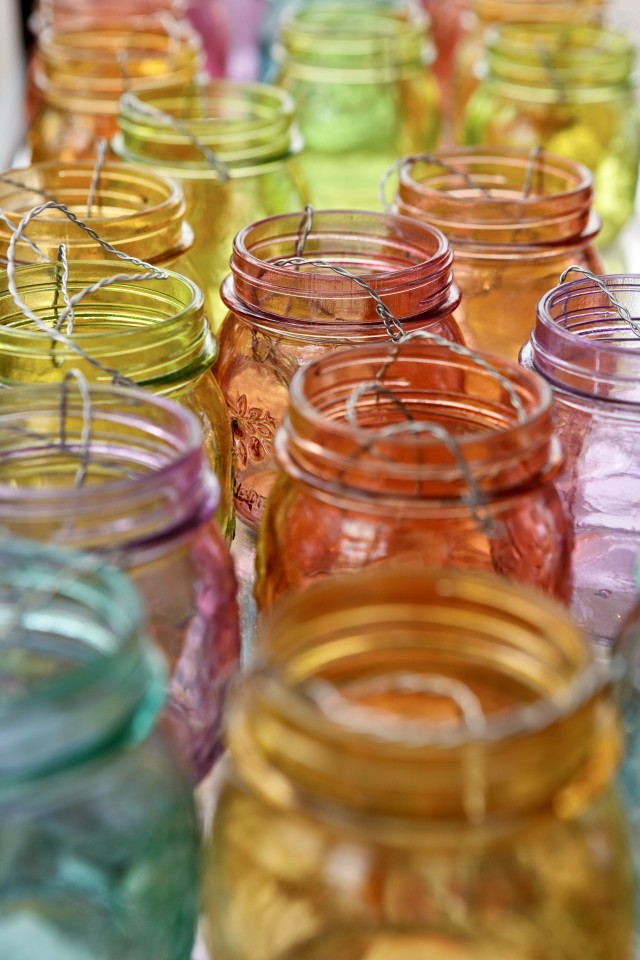
Glass and Sustainability: The Nitty Gritty Details
You’ve got the backstory, but why is glass packaging the go-forward choice for JOI? Let’s dive right into the details.
Production Process
All kinds of glass, including glass bottles and jars, are made from common materials like sand, soda ash, and limestone. The Cliffs Notes version of the science goes like this: the raw materials are melted together at super high temperatures to form a liquid-like conglomerate that gets cooled off to form glass. Ta-da! Glass making is an ancient and super natural process that requires no man-made materials and produces a finished product that is infinitely recyclable.
Recycling
Did you catch that line about ‘infinitely recyclable’? Yeah, that’s pretty cool. Essentially, glass can be melted down again and again (and combined with its raw materials) to produce more glass--same quality, no waste or by-products. This does mean that commercial recyclers need to go through the extra effort and cost of pulling glass out into separate recycling streams. But, using recycled glass to make new glass also requires less heat than when using raw materials only, meaning there’s less environmental impact. Think of it as a virtuous cycle.
Food Preservation & Safety
Science trivia time! Did you know that glass is both inert and impermeable? These two important qualities make glass pretty outstanding as a food packaging material. Because it’s inert, glass doesn’t interact with the food packaged inside of it, so all those delicious qualities like flavor, aroma, and taste won’t change. And because it’s impermeable, you can feel confident nothing nasty (like chemicals) will leach into glass packaged foods. Don’t say that high school chemistry class wasn’t worthwhile.
5 Ways to Reuse Glass Containers
Recycling is great, but reusing is even better. And when it comes to reusability, it’s hard to beat glass. This is one of the biggest advantages of glass vs plastic.
For example, have you ever noticed that spaghetti stain in your plastic tupperware? Or that it still smells real spicy from your last curry dish? That’s because all plastics are porous--over time, they take on the smells and flavors of whatever is put in them.
But, because glass is completely inert it never takes on the flavor of whatever it’s most recently been storing. We’re so excited about the possibilities this opens up with our new JOI glass containers. So, toss those empty jars of JOI in the dishwasher and set them off on their next adventure. Here are 10 simple ideas for reuse to get you started:
- Store a batch of JOI plant milk
- Mix up single-servings of chia pudding for the week
- Whip up individual batches of overnight oats
- Spice up week day lunches with a perfectly shaken salad-in-a-jar
- Use as a vase for a small bouquet of flowers
- Make rooms sparkle with DIY luminaries
- Get crafty with homemade candles
- Plant an indoor herb garden
- Add simple storage for household supplies
- Wow your friends and family with giftable cookies-in-a-jar or JOI lattes-in-a-jar
Coming very soon: clean, reusable glass JOI containers!





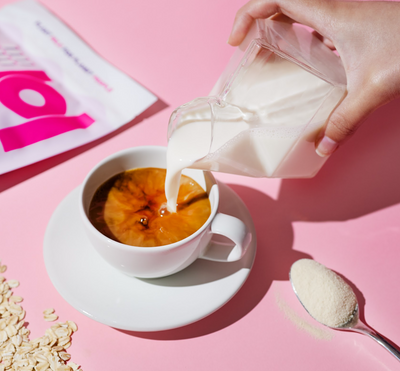
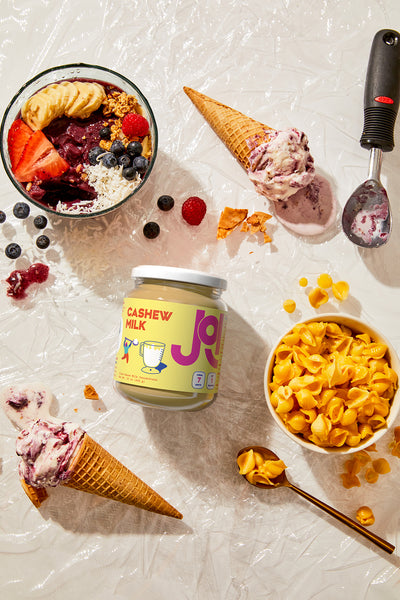
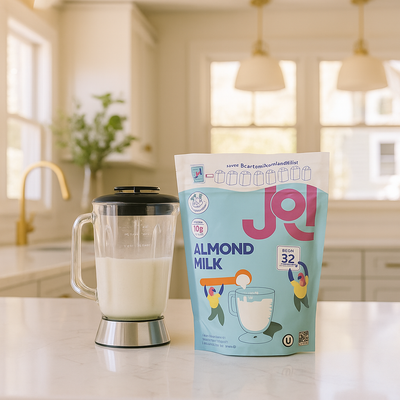
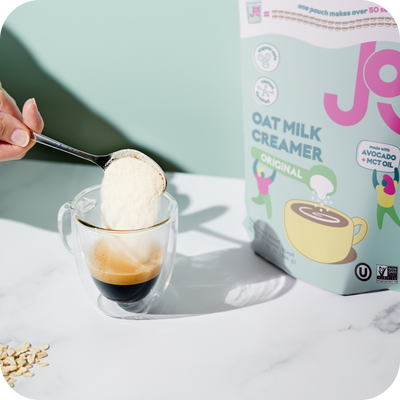
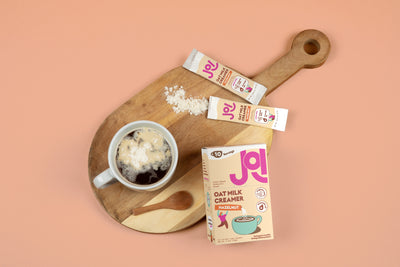
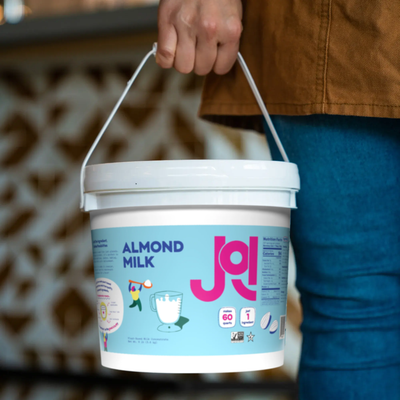
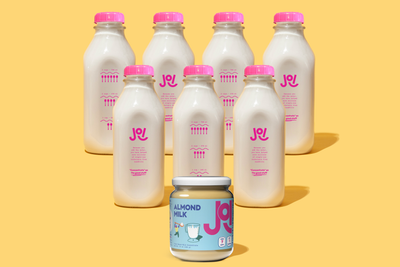
 CHECKOUT
CHECKOUT